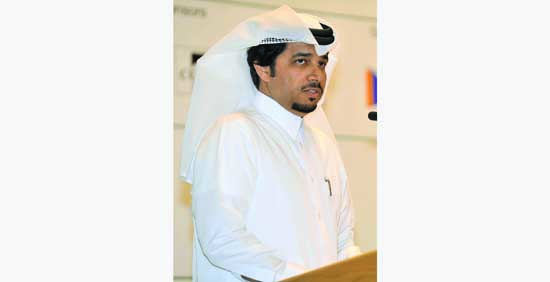

By Raynald C Rivera
DOHA: The Ministry of Municipality and Environment plans to expand the Domestic Solid Waste Management Centre (DSWMC) upping its capacity from 2,300 to 5,300 tonnes of waste a day, as well as build another centre with a capacity of 3,000 tonnes a day.
“Now we have some studies and proposals to expand the existing plant to upgrade it from the current 2,300 tonnes a day capacity to 5,300 tonnes to take us to 2022 with full capacity. Within three to four years, we will have another one in the north with a capacity of 3,000 tonnes for us to achieve QNV 2030 with sustainable environment. This is our plan,” said Safar Mubarak Al Shafi, Director of General Cleanliness Project, Mechanical Equipment Department and Waste Treatment Center at the Ministry of Municipality and Environment.
Al Shafi was talking to mediapersons on the sidelines of the sixth Waste Management and Recycling Summit which opened yesterday at InterContinental Doha The City. Like its predecessor, the new waste treatment facility being planned, he said, would be designed in keeping with the most advanced technology in the world.
The DSWMC on a 3sqkm area in Mesaieed is a pioneering facility and unique in the world.
“It is the first and only waste-to-energy plant in the Middle East. It is unique in the world because it is integrated, having all facilities for recycling in one place — incinerator, composting plant, segregation area, landfill and energy recovery,” Al Shafi said.
Many places around the world such as Europe have incinerators instead of composting plants because they have more green areas unlike Qatar and other countries in the region which have vast desert areas so they are looking at building composting plants, he added.
“Qatar has invested around QR4bn for the centre, QR2bn for design and building and QR2bn for 20 years of operation.
It shows how Qatar is committed to the environment and leads in the Middle East when it comes to environmental issues.”
Operating for four years, DSWMC has a capacity of 2,300 tonnes of waste a day, around 95 percent of which is recycled or converted to energy.
“The centre produces 50MW of which 42MW goes to the national electricity grid while the remaining 8MW is used to operate the centre, thus it is a self-sufficient facility.”
In emergency cases, the centre’s capacity can be increased by 20 percent to 2,800 tonnes a day, he added.
Around 3,000 tonnes of waste is generated a day in Qatar and around 2,200 tonnes of waste is collected through the ministry’s General Cleaning Project, and around 600 to 800 tonnes is collected by the private sector from commercial buildings, he said.
While majority of the waste is organic (55 percent). around 17 percent is paper which accounts for 450 to 500 tonnes of total waste and that’s why the ministry is keen on recycling paper, he said.
“We will target the ministries, authorities and banks which generate a lot of paper waste.
“This will be a good step for recycling paper which will reduce the quantity of waste going to the centre and contribute to saving the environment,” he said, adding there are two to three paper recycling factories to which paper segregated from the source will be sent.
Waste segregation, he said, is being extensively implemented in schools. “We have covered 189 schools, including 89 primary schools two years back, 52 middle schools last year and 48 secondary schools this year. We provide them with containers, visit them and deliver lectures on how they should segregate wastes.”
On tyre recycling, he said around 12 million tyres have been collected to date.
“There around 13 firms working on recycling tyres and we allocated areas for them in Umm Al Affai and Rawdat Rashed. Within two-and-a- half years, we have treated around 2.5 million tyres and are looking for more companies to join us.”
Al Shafi is optimistic that more private companies will be encouraged to engage in tyre recycling “because we charge a nominal fee of around QR36,000 a year to rent the area. Tyres are free.”
As the population swells with the country’s boom, people’s behaviour towards proper garbage disposal remains one of the major challenges the ministry faces, he said.
“If they follow rules and dump garbage in bins, we will not face these issues,” Al Shafi added.
The Peninsula




